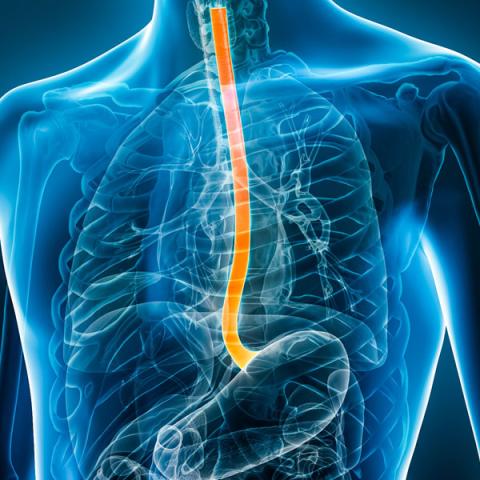With a new five-year, $11.2 million grant from the National Cancer Institute (NCI), researchers at Case Western Reserve University and University Hospitals hope to learn what causes—and how to reduce and treat—esophagus cancers, an increasingly common and deadly disease.
Cancer of the esophagus, especially esophageal adenocarcinoma (EAC), is highly lethal, with 80% of patients dying from the disease within five years of diagnosis, according to Kishore Guda, an associate professor at Case Western Reserve University School of Medicine. And patients with Barrett’s esophagus (BE), marked by a change in normal cells lining the esophagus, are at high risk of developing EAC.
Guda is leading the NCI-funded research with Amitabh Chak, a professor at the School of Medicine, physician at University Hospitals Cleveland Medical Center and the Brenda and Marshall B. Brown Master Clinician in Innovation and Discovery. Both are also members of the Case Comprehensive Cancer Center and have been studying this form of cancer for two decades.
“This program,” Chak said, “is a culmination of decades of collaborative research between clinical investigators and basic cancer researchers.”
With this new round of funding, they will focus on how these types of cancers originate—specifically, the molecular and genetic factors that trigger why and how Barrett’s esophagus develops and progresses to esophageal cancer.
“The goal,” Guda said, “is to translate our discoveries into effective prevention and treatments for patients, which, in turn will reduce cancer mortalities from this lethal disease.”
Their five-year project will consist of three parts, each based on their previous research:
- By studying family clusters of BE/EAC, they had discovered that people with inherited defects in a gene called VSIG10L are at a higher risk of developing the disease. Part one will involve studying human tissue and animal models to determine its function in the esophagus and how defects in the gene trigger the development of BE/EAC.
- They recently found that specialized cells from submucosal glands, are critical for repair and healing the esophagus after an injury. Based on preliminary findings, they believe prolonged inflammatory changes in these glands from acid reflux or stomach bile can prevent normal healing, leading to BE/EAC. In part two of the project, in collaboration with and led by Katherine Garman, an associate professor of medicine at Duke University, they will study what immune cells change within the submucosal glands during injury, and how those changes affect healing and trigger the disease.
- Part three focuses on their recent finding that EphB2, a key protein present on the surface of the cells, regulates many of the cellular mechanisms that play a central role in BE/EAC development. They also discovered EphB2 is activated early in the abnormal mucosal glands lining under the surface of the esophageal layer. Based on these findings, they believe inherited or acquired defects in genes (from part one), and/or abnormal inflammatory changes (from part two), can activate EphB2 early during the development of BE/EAC. They will test whether and how: EphB2 activated in abnormal submucosal glands drives BE/EAC development and prevents normal healing of the injured esophagus.
For more information, contact Bill Lubinger at william.lubinger@case.edu.


